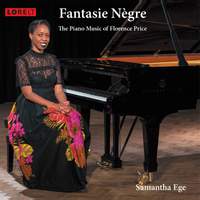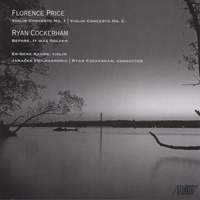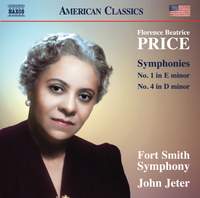Interview,
Dr Samantha Ege on Florence Price
 One of my personal highlights from last month's crop of new releases was an exhilarating recital of piano music by African-American composer Florence Price from musicologist and pianist Dr Samantha Ege (currently a Junior Research Fellow in Music at Lincoln College Oxford), who recently gave a fascinating live-streamed lecture-recital on Price and her contemporaries to mark International Women's Day 2021.
One of my personal highlights from last month's crop of new releases was an exhilarating recital of piano music by African-American composer Florence Price from musicologist and pianist Dr Samantha Ege (currently a Junior Research Fellow in Music at Lincoln College Oxford), who recently gave a fascinating live-streamed lecture-recital on Price and her contemporaries to mark International Women's Day 2021.
It was a great pleasure to speak to Samantha about her research on Price and other Black composers living and working in Chicago in the mid-twentieth century, the reception of Price's music during her lifetime, and the prospect of exploring her Piano Concerto in its original orchestration...
When and how did you first encounter Florence Price's music?
I first learned about her when I was an exchange student at McGill University in Canada and the professor, Lisa Barg, ran a course on early twentieth-century music. I remember one week we were focusing on Lili and Nadia Boulanger, which was really eye-opening for me because I hadn’t learned about women composers in that context before: to actually study who they were and the music they created, and then to situate that in a historical context made me reconsider the way we talk about ‘the canonic greats’. The following week the focus was on the music of Florence Price and Margaret Bonds, which was even more of a revelation because it then occurred to me that of course Black women were a part of this history too. And that was the first time that I felt really visible within classical music - because we’re always looking back to the past there is inevitably a certain sense of distance, but until then I didn’t really appreciate just how much distance I felt in not being able to see anyone that shared a similar heritage to me.
The piece we listened to in that seminar was the Fantasie Nègre in E minor – at that point the knowledge of the other Fantasies wasn’t available, and this being the beginning of my journey that was the only piece of hers that I knew. I remember being really blown away by the musical language: the Romantic style was very familiar to me by then, so I could see the influence of Brahms and Chopin and the kinds of pieces that I was studying at that time, but I could also hear the African-American spiritual influence. Even though I didn’t know much about the spiritual genre at that stage, I could hear that Price was drawing upon her heritage - oftentimes when we hear composers using Black traditional influences we tend to refer back to the canon and think about people like Gershwin and Copland, but what stood out to me was that Florence Price was using a much earlier type of Black folkloric music and bringing that into play with the Romantic tradition.
Were the other Fantasies among the many manuscripts which were discovered at Price's abandoned house in Illinois in 2009?
Yes, they were. The wonderful thing about being a Price scholar is that there are many of us with different priorities: it made sense for the violinist Er-Gene Kahng to dig into the violin concertos, for instance, and several others have focused on symphonic works. Because I’m a pianist, my focus was to recover and record the four Fantasies, because I envisioned being able to present them as a complete set – oftentimes histories around women are so incomplete, so it meant a lot to me to be able to present them as part of a whole narrative. When I began my research the third one was noted as being incomplete, but I figured that so many pieces have come to light that I wasn’t ready to accept that as the end of the story!
Aside from Price herself, which other artists championed her music during her lifetime?
Price was a pianist, organist and violinist, and during her lifetime she performed a lot of her own piano works. The Fantasie Nègre No. 1 in E minor is actually dedicated to Margaret Bonds, who represented the next generation that was mentored by people like Price and her contemporaries like William Dawson. With this piece it was really interesting to look at the performance history, because Price and Bonds performed it not only as a duet but also as a ballet – there was a very prominent Black dancer and choreographer, Katherine Dunham, who was basically trying to achieve in dance what Florence Price was trying to achieve in music in terms of blending the classical and vernacular style, so the fact that they came together around this piece of music was incredible to read about.
The Fantasie Nègre No. 4 was performed a little bit later, I think around 1936; it underwent several revisions, and with each revision the piece became a little shorter, more condensed. I do wonder if Price did that to increase her publishing prospects, because as a woman of African descent there was a sense that she had to really market her music: she was writing some very big, expansive pieces and I don’t know if there was a market for that, just because of how harshly women composers were judged. That’s another reason why it was really important to find the original version, so we can hear that expansive and virtuosic language.
How easy was it to build up a picture of the reception-history of her music?
For the Piano Concerto, certainly, there are contemporary reviews across both the Black and white press. Some of Price’s solo piano music was documented in the Black press, but I feel that it was more to amplify what she was doing rather than to offer a critical review, whereas in the white press I see more of that. I guess it’s because her music would have represented different things to the mainstream versus her own community – their goal was to keep pushing her name forward, to sustain the public awareness of her and work towards her wider recognition. That has been helpful in terms of giving me an idea of what she was playing and where, but in terms of critical reviews there’s relatively little.
Who do you see as Price's main influences and inspirations, and which composers did she influence in turn?
Price was definitely influenced by earlier composers like Henry T. Burleigh, who studied with Dvořák; there’s a lot of research around Dvořák’s use of African-American folk music, and Burleigh’s influence there. Burleigh was a very important figure because he was part of that first post-slavery generation of composers, so he also represented a sense of progress: around him were composers like R. Nathaniel Dett, who was born in Canada but spent most of his career in the US. And even just within the Chicago network at this time we have a number of women who are writing in this sort of Romantic style and bringing in Black folk influences; around the time Florence Price arrived in the city, there was a woman called Nora Holt who wrote a symphonic work based on African-American folk-songs. Unfortunately her music was stolen, and we’re in a situation where we just don’t know where it is now – hopefully it’ll turn up in a house somewhere like Price’s did… She wrote so much, and had the same sort of influences as Price.
The next generation of Chicago women included people like Margaret Bonds, Betty Jackson King and Irene Britton Smith – women who were born into a pre-existing infrastructure of concert life in both the immediate community of Black practitioners as well as the mainstream, and to whom certain avenues were far more accessible. And what I notice about that next generation is that they travel: Irene Britton Smith had studied with Nadia Boulanger; Margaret Bonds wrote to Boulanger to ask to study with her, and Boulanger said something along the lines of ‘I think your style is already quite developed and you have a strong identity, so I’m not sure if I can help you there.’ But this next generation on the whole seemed able to expand their reach and pursue international careers.
How much more piano music by Price is awaiting its premiere recording, and do you have plans in that regard?
Yes. I think the next stage for me is her collaborative works – I’m looking forward to exploring the chamber music, and also the Piano Concerto. I know the Piano Concerto has been done before, but there’s a very interesting narrative around that: the initial recordings were based on a reconstruction because a lot of the music wasn’t there at that stage, and now that the original orchestration is available I’m really excited about the prospect of studying Price's original ideas.
Have you encountered resistance from venues and organisations in terms of programming music by composers from under-represented groups, or is the tide finally beginning to turn?
I often wonder if I’m the best person to answer that question, because my work comes from being a musicologist first and foremost, and in a way I feel that’s helped me to circumvent some of the barriers: I approach my repertoire from a research perspective, so I’ve found people who were very receptive to the work that I’ve done in terms of offering performance opportunities. I’ve experienced a lot of really great responses and support, and now I’m seeing other institutions and bodies engage Price’s repertoire, so things are definitely moving in a great direction.
I think the next thing to do, though, is to resist canonising Price as the representative of Black composers: we need to make sure that we’re continuing to look around her and to investigate the women and men who were part of her network. I think some really rich programmes could emerge by looking at her music alongside works by William Grant Still and Margaret Bonds, and then venturing further out into the current day… So whilst my own journey may have begun with Florence Price, I hope things don’t stop there!
You can watch Dr Samantha Ege's lecture-recital 'The Black Chicago Renaissance Women: Lives & Legacies in Music' here . The performance was streamed from Lincoln College Oxford in association with TORCH (The Oxford Research Centre in the Humanities) last month to celebrate International Women's Day.
Samantha Ege (piano)
Available Format: CD
Er-Gene Kahng (violin), Janáček Philharmonic Orchestra, Ryan Cockerham
Available Formats: MP3, FLAC
Fort Smith Symphony, John Jeter
Available Formats: CD, MP3, FLAC, Hi-Res FLAC





